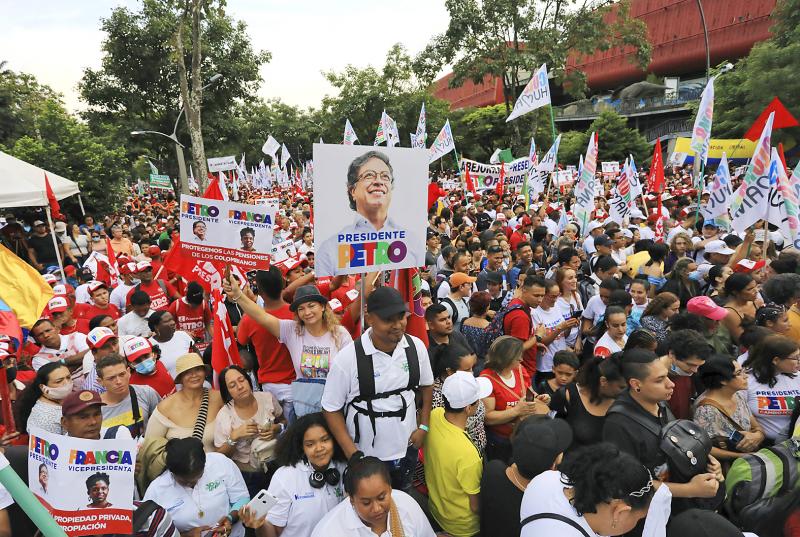Fabian Espinel last year helped to organize roadblocks where young people protested against police violence and government plans to increase taxes on lower income Colombians.
Now, as Colombia heads into its presidential election tomorrow, Espinel walks the streets of working-class sectors of Bogota handing out flyers for front-running candidate Gustavo Petro and helps paint murals in support of the leftist politician.
“Young people in this country are stuck,” said Espinel, who lost his job as an event planner during the COVID-19 pandemic and received no compensation from his company. “We hope Petro can change that. We need an economic model that is different than the one that has been failing us for years.”

Photo: AP
Colombians are to pick from six candidates in a ballot being held amid a generalized feeling the nation is heading in the wrong direction.
The latest opinion polls suggest Petro could get 40 percent of the votes, with a 15-point lead over his closest rival, but the senator needs 50 percent to avoid a run-off election next month against the second-placed candidate.
His main rival through most of the campaign has been Federico Gutierrez, a former mayor of Medellin who is backed by most of Colombia’s traditional parties and is running on a pro-business, economic growth platform, but populist real-estate tycoon Rodolfo Hernandez has been rising fast in polls and could challenge for the second spot.
He has few connections to political parties and said he would reduce wasteful government spending and offer rewards for Colombians who denounce corrupt officials.
Petro, a former rebel with anti-establishment rhetoric, promises to make significant adjustments to the economy, as well as change how Colombia fights drug cartels and other armed groups.
His agenda largely centers on fighting inequalities that have affected the South American nation’s people for decades and became worse during the COVID-19 pandemic.
He has promised government jobs to people who cannot get work, free college tuition for young Colombians and subsidies for farmers who are struggling to grow crops, which he said he would pay for by increasing taxes on wealthy individuals and corporations.
His agenda also touches on issues that could shake up Colombia’s tight-knit relationship with the US.
Adam Isacson, a defense policy expert at think tank Washington Office on Latin America, said that if Petro wins the election “there will be more disagreement and distance” between both nations.
Petro wants to renegotiate a free-trade agreement with the US that has boosted imports of American products such as powdered milk and corn, and instead favor local producers.
He also promises to change how Colombia fights drug cartels that produce about 90 percent of the cocaine sold in the US.
The senator often criticizes US drug policy in the hemisphere, saying it “has failed” because it focuses too much on eradicating illegal crops and arresting kingpins. He wants to boost help for rural areas, to give farmers alternatives to growing coca, the plant used to make cocaine.
Isacson said coca eradication targets could become less of a priority for the Colombian government under a Petro administration, as well as the pace at which drug traffickers who are arrested are sent to the US to face charges.
The election comes as Colombia’s economy struggles to recover from the pandemic and frustration grows with political elites.
A Gallup poll conducted earlier this month said that 75 percent of Colombians believe the nation is heading in the wrong direction and only 27 percent approve of conservative Colombian President Ivan Duque, who cannot run for re-election.
A poll last year by Gallup found that 60 percent of those questioned were finding it hard to get by on their household income.
Sergio Guzman, a political risk analyst in Bogota, said the pandemic and the 2016 peace deal with the Revolutionary Armed Forces of Colombia rebel group have shifted voters’ priorities.
“Whereas previous elections centered around issues like how to deal with rebel groups, now the main issue is the economy,” Guzman said. “Voters are concerned about who will tackle issues like inequality or the lack of opportunities for youth.”

‘IN A DIFFERENT PLACE’: The envoy first visited Shanghai, where he attended a Chinese basketball playoff match, and is to meet top officials in Beijing tomorrow US Secretary of State Antony Blinken yesterday arrived in China on his second visit in a year as the US ramps up pressure on its rival over its support for Russia while also seeking to manage tensions with Beijing. The US diplomat tomorrow is to meet China’s top brass in Beijing, where he is also expected to plead for restraint as Taiwan inaugurates president-elect William Lai (賴清德), and to raise US concerns on Chinese trade practices. However, Blinken is also seeking to stabilize ties, with tensions between the world’s two largest economies easing since his previous visit in June last year. At the

UNSETTLING IMAGES: The scene took place in front of TV crews covering the Trump trial, with a CNN anchor calling it an ‘emotional and unbelievably disturbing moment’ A man who doused himself in an accelerant and set himself on fire outside the courthouse where former US president Donald Trump is on trial has died, police said yesterday. The New York City Police Department (NYPD) said the man was declared dead by staff at an area hospital. The man was in Collect Pond Park at about 1:30pm on Friday when he took out pamphlets espousing conspiracy theories, tossed them around, then doused himself in an accelerant and set himself on fire, officials and witnesses said. A large number of police officers were nearby when it happened. Some officers and bystanders rushed

Beijing is continuing to commit genocide and crimes against humanity against Uyghurs and other Muslim minorities in its western Xinjiang province, U.S. Secretary of State Antony Blinken said in a report published on Monday, ahead of his planned visit to China this week. The State Department’s annual human rights report, which documents abuses recorded all over the world during the previous calendar year, repeated language from previous years on the treatment of Muslims in Xinjiang, but the publication raises the issue ahead of delicate talks, including on the war in Ukraine and global trade, between the top U.S. diplomat and Chinese

RIVER TRAGEDY: Local fishers and residents helped rescue people after the vessel capsized, while motorbike taxis evacuated some of the injured At least 58 people going to a funeral died after their overloaded river boat capsized in the Central African Republic’s (CAR) capital, Bangui, the head of civil protection said on Saturday. “We were able to extract 58 lifeless bodies,” Thomas Djimasse told Radio Guira. “We don’t know the total number of people who are underwater. According to witnesses and videos on social media, the wooden boat was carrying more than 300 people — some standing and others perched on wooden structures — when it sank on the Mpoko River on Friday. The vessel was heading to the funeral of a village chief in